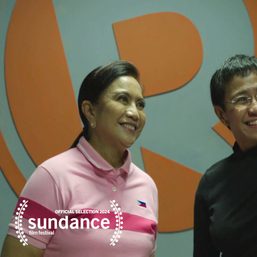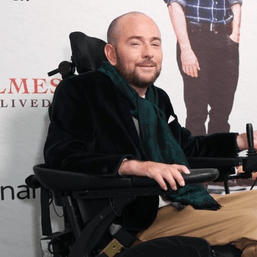SUMMARY
This is AI generated summarization, which may have errors. For context, always refer to the full article.

Filipino filmmaker Drama del Rosario feels a mix of shame and amusement when he looks back at his younger years and admits that he wasn’t exactly an ideal person to be with. Now 25 years old and residing in Los Angeles, the Manila-born creative ponders on the past with more clarity.
“I realize back then, my mistreatment of others was a result of my coping. I want a lot of gay people to realize that the whole ‘mean girl student’ thing could be a result of your coping and that it is not a good way to go about it.” he said in an interview with Rappler that aired on Thursday, August 7.
Coming to terms with what’s happened in his life by translating it into film years later has, since then, become the driving force in Drama’s work.
In his documentary, In This Family, Drama looks back at an especially painful experience — of being forced to come out as a teen because a teacher told his parents.

Troubled times
Drama studied in an private, all boy’s institution where he had to deal with a lot of prejudice towards his sexuality. “I was an overachiever in my academics because it was a way for me to tell myself that I am worth something,” he said.
It was in these same years that Drama first found his love for performance, through the school theater club. Although it was his passion, his parents were less than supportive of the club. “My parents wanted me to become a doctor. Being a performer was not an option.”
The young Drama persevered, and wrote in a letter to himself in 7th grade: “When I grow up, I hope to be very successful. I want to be a singer, actor, or any creator exposed to the arts.”
But it was in the same safe space where Drama could finally be himself in was where the rug was pulled out from under his feet.
“My teacher had told my parents that I was gay without my consent and to this day, I don’t know why they did that,” Drama recounts in the documentary. What follows are recordings of an argument between him and his parents, as Drama details the struggles of coming out when he wasn’t ready yet.
Drama explained recording everything his parents said was simply a stroke of luck – iPhone recordings were a novelty and he just wanted to keep the memory for himself.
The personal, the public
“I have been silenced so much in my life. So many people have told me how they don’t understand what queer people go through. Making documentaries is a way for me to voice out what I need to say,” explained Drama.
That it’s his story makes it necessary to put himself in the spotlight – an approach Drama knows is often criticized. While the young filmmaker understands the criticism, he is also quick to point out differences in representation.
“The filmmaking industry right now in America is mostly dominated by white, heterosexual males and this only proved more the need for me to speak up about my experiences. The comments of how personal documentaries aren’t necessary usually come from straight white filmmakers, the very people who are used to hearing their own stories be represented in the media,” he said.
“Turning a camera on myself felt like a necessity at that point because no one else would be able to tell my story better than myself,” he added.
The story, of course, isn’t just Drama’s. It’s also his parents’ and how they “grew up” and accepted their children. “As a child, to see your parents grow is just an amazing thing,” he says at the end of the documentary.
While it’s his specific story that he’s telling, Drama said In This Family has made a mark on its viewers, especially young boys who, like him in the past, struggle with their homophobia.
“I’ve had people reach out to me after watching the documentary and some of them even came from the same school I was in. The sad part is that some of them still experience the same homophobia and discrimination from the same teachers,” he said.
Making it
As soon as he earned his undergraduate degree in the Philippines, Drama was sure he wanted to pursue graduate studies in the US.
“I remember after getting my student visa from the [US] embassy, looking out towards the horizon of Manila Bay thinking to myself that I’m going farther than that. My family had to pull a lot of strings to get me here and knowing that I only had 3 years before I could apply for an extension, I had to make it count in any way I could,” he said.
And life has not been easy. He’s had to navigate, find, and make space for himself in an industry where he’s a minority, and he’s struggled with making ends meet.
A carrot and celery diet, Drama recalled, is proof of that.
He isn’t planning to putting his – and his family’s efforts – to waste. Already, Drama is working on a new project – a documentary that tackles sexual abuse and how they affected his own relationship. There are also other things in the pipeline, although he’s can’t quite talk about that just yet.
Things are only beginning for Drama del Rosario and a world of stories – coronavirus restrictions considered – is his to tell.
And there’s absolutely no tinge of shame or amusement in that. – Rappler.com
Renzo Guevara is a Rappler intern
Add a comment
How does this make you feel?
![[Only IN Hollywood] After a thousand cuts, and so it begins for Ramona Diaz and Maria Ressa](https://www.rappler.com/tachyon/2024/02/Leni-18.jpg?resize=257%2C257&crop=262px%2C0px%2C720px%2C720px)




There are no comments yet. Add your comment to start the conversation.